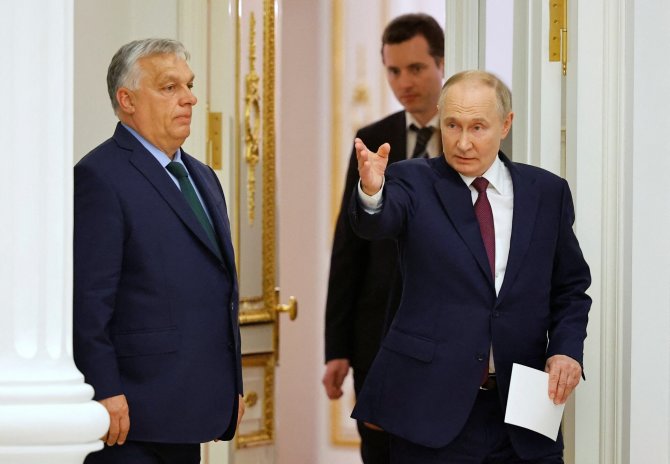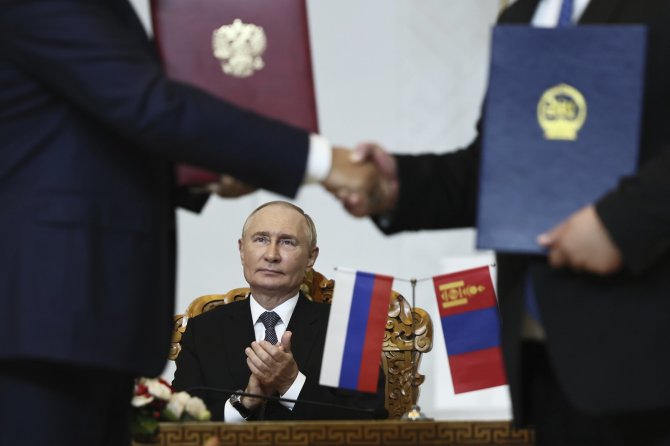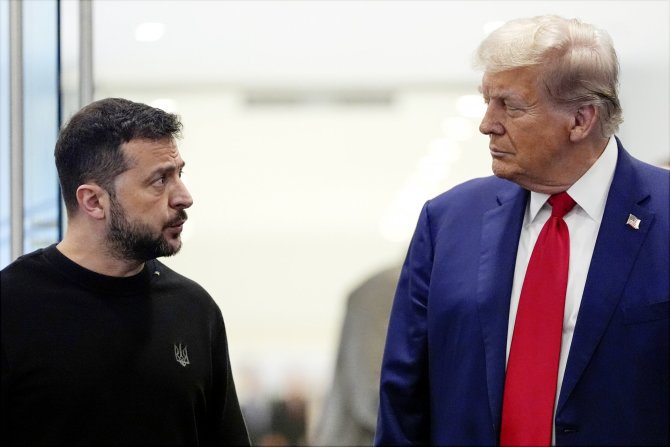Anton Barbashin, a political analyst and editor of Riddle Russia magazine, noted in an article in The Insider that the Kremlin’s hopes are now focused on Donald Trump. However, if the peace talks fail, Putin seems destined to remain a global outcast.
Talks about Russia’s isolation and its retreat to the margins began after 2014. illegal annexation of Crimea. At the G-20 summit in Australia in November of that year, many world leaders actively shunned Putin, forcing him to leave before the meeting was over.
The most noticeable change is Moscow’s more active communication with representatives of NATO countries, international organizations and states that previously declared support for Ukraine.
“Over the next decade, the West continued to view Russia as toxic on the world stage, limiting its partnership and turning Putin into a leader with whom few would want to engage openly.” However, it is clear that the Kremlin’s isolation strategy was not entirely successful,” The Insider writes.
in 2024 Moscow has reappeared on the world diplomatic stage. The BRICS summit, visits by the presidents of Hungary and Slovakia, and a trip to the country by the United Nations secretary-general forced even Putin’s staunchest critics to admit that Russian diplomacy had achieved a public relations victory of sorts.
But how significant is this success? And why, after a three-year war, does V. Putin increasingly receive high-ranking delegations in Moscow?
In 2024, Putin’s international map expanded to 11 countries, the highest number since 2019.
Putin is not the only actor in this story. In recent years, representatives of the Russian Ministry of Foreign Affairs have been actively traveling around Africa. Last year, Russia opened two new embassies on the continent and plans to open three more. In addition, Russian cultural centers are constantly being established throughout Africa.
According to the author of the article, the most noticeable change is Moscow’s more active communication with representatives of NATO countries, international organizations and states that previously declared support for Ukraine or voted for pro-Ukrainian resolutions at the UN.
A.Barbašinas explains this change with three main factors.
Waiting for peace
The most important catalyst for the restoration of diplomatic relations with Russia is the prospect of peace talks with Ukraine.
These discussions are almost entirely dependent on the future presidency of D. Trump, who has repeatedly expressed his intention to mediate the conclusion of an agreement between Moscow and Kyiv. Many countries have expressed their willingness to engage in these talks, seeing them as an opportunity to greatly benefit from the end of Europe’s biggest conflict since World War II.
If successful, Budapest and Bratislava could also reasonably expect a large “economic thank you” from Moscow for their mediation efforts.
Two of Europe’s main contenders for mediators are the same politicians who have been making visits to the Kremlin in recent months: Prime Minister of Hungary V. Orban and Prime Minister of Slovakia R. Fico.
Both leaders position themselves as opponents of a tough approach to Russia, criticize Western sanctions policy and openly express their admiration for D. Trump. Both have also offered their countries as locations for possible peace talks. in 2024 in the summer, V. Orban managed to visit both Kyiv and Moscow with a mission known to him alone in the name of peace.
It is worth noting that both Hungary and Slovakia are highly dependent on Russian gas supplies. in 2024 Hungary imported more than 7.5 billion cubic meters of Russian gas – the total domestic consumption was about 8.5 billion cubic meters.
In Slovakia, Russian gas accounts for slightly more than half of the domestic consumption. However, until recently, Russia supplied almost 100 percent of country’s energy needs. Slovakia is particularly vulnerable to the 2025 January 1 of the effective suspension of Russian gas transit through Ukraine.
“After the end of the war or the conclusion of a ceasefire in Ukraine, economic cooperation with Russia would be greatly facilitated for both of these EU countries. In case of success, Budapest and Bratislava could also reasonably expect a large “economic thanks” from Moscow for their mediation efforts,” the author of the article estimated.
Both Moscow and pro-Russian European countries believe that stopping the war would lift sanctions — at least some of them — which would help state budgets and increase the wealth of ruling elites willing to broker a truce.
Qatar, Turkey and UN Secretary-General Antonio Guterres, whose visit to Moscow caused great indignation among supporters of Ukraine, are not left out.
Meanwhile, some countries supplying arms to Ukraine are also trying to restore high-level ties with Russia. German Chancellor Olaf Scholz in 2024 in November for the first time since 2022 in december called V. Putin. However, from media reports, it was not effective.
A. Barbashinas noticed that so far the contacts of the named heads of state with V. Putin have not helped to achieve any concrete changes regarding the Kyiv-Moscow compromise – not to mention the complete restoration of peace.
Moscow will be willing and able to pay more for foreign goods and services, interest in doing business with Russia will continue to grow.
“Nevertheless, the gradual restoration of relations with Russia reflects expectations that by 2025 progress will be made on this matter,” he added.
A tempting opportunity
The article highlights that the main factor behind the almost constant communication of the “global majority” with Russia is the economic benefits of cooperation with Moscow.
From Armenia and Sakartvel to India, China and the United Arab Emirates, the war in Ukraine has provided opportunities for profit, from perfectly legal and transparent deals involving Russia to schemes involving outright sanctions evasion.
“Few expected the Russian economy to withstand sanctions while increasing military spending and offering additional incentives to its partners because of the risks associated with such toxic cooperation.” However, as long as Moscow is willing and able to pay more for foreign goods and services, interest in doing business with Russia will continue to grow,” predicted the author.
Currently, many companies have already found ways to import and export almost anything to Russia. Even the most detailed economic forecasts do not foresee significant obstacles for Russia to maintain its current level of spending at least until 2026.
Such pragmatism also explains why in 2024 A number of world leaders will take part in the BRICS summit to be held in Kazan, noted A. Barbashinas.
“Neither Ukrainian nor Western diplomacy has been able to offer viable alternatives to countries that are still actively trading with Russia. “Moral arguments alone are not enough to convince countries like India that doing business with Russia is wrong – especially when the benefits of Russian trade with the countries of the Global South often come from Western countries themselves, who buy Russian oil or gas sold by Moscow’s partners,” he wrote. he.
Someone else’s war
The problem, the article says, is that the majority of the world community does not see the war in Ukraine as a challenge to the liberal world order or any law-based international system, but as a conflict of European powers taking place in Europe.
Not all countries are ready to follow Mongolia’s example and ignore the International Criminal Court’s arrest warrant for Putin.
Studies of the attitude of the countries of the Global South towards the war in Ukraine have revealed that the vast majority of non-Western countries remain indifferent and do not feel the obligation to take any side.
Western sanctions still leave their mark. With the exception of Iran and North Korea, all states try to follow certain rules to avoid secondary restrictions. However, as practice shows, imposing sanctions is much easier than ensuring their implementation.
“If Moscow wants to establish relations with African countries or offer its capital to the countries of the Persian Gulf, these countries are unlikely to refuse the benefits, whether it is done out of solidarity with Ukraine or out of respect for Washington’s demands. Rather, experience shows that it is often difficult for Ukraine to secure understanding from states that benefit from cooperation with Russia from a diplomatic or economic point of view,” the journalist highlighted.
However, in his opinion, this does not mean that Russian diplomacy by 2025 emerges as a clear winner, poised to secure a stronger position in the years to come.
According to the article, not all countries are ready to follow Mongolia’s example and ignore the International Criminal Court’s arrest warrant for Putin. Even South Africa, a BRICS ally, has refused to invite the Russian president to the G-20 summit, preferring to avoid the dilemma of whether to detain him and damage relations with Moscow, or allow him to move freely and strain Pretoria’s relations with the West.
Even Russia’s closest partners refused to recognize the annexation of the Ukrainian territory, and Putin, looking for support, went to North Korea, a country that Russia itself considered a border until recently.
Second, a large part of Russia’s current diplomatic push depends on the prospect of talks between Putin and Trump.
“If these talks fail and sanctions remain firmly in place, it will be increasingly difficult for Moscow to convince its partners to take risks on its behalf. At the same time, V. Putin’s allies in Europe will have to accept the permanent loss of cheap Russian gas and prepare to rely more on American liquefied natural gas,” the author said.
Finally, Russia’s diplomatic success depends heavily on Moscow’s purchasing power. But the ongoing war continues to drain the Kremlin’s resources, including funds it uses to circumvent sanctions.
“If in two or three years Russia is forced to cut costs due to dwindling reserves, its friends and partners may begin to doubt whether it is really worth maintaining relations with a toxic and increasingly impoverished country,” concluded A.Barbashin.
Source: www.15min.lt





